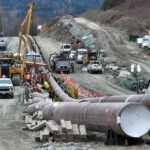From BNN/Bloomberg
(Bloomberg) — Prime Minister Justin Trudeau’s government decided Tuesday to proceed with the construction of a major crude oil pipeline, saying the project has met strict requirements on safety and consultation with Canadian indigenous groups.
Trudeau’s cabinet approved the expansion of Trans Mountain, a state-owned pipeline that runs from Alberta to Vancouver. The line will add 590,000 barrels of daily shipping capacity, a 15% boost to Western Canada’s current 4 million. Trudeau said the crown corporation responsible for building the pipeline hopes to have shovels in the ground in the current construction season.
“Take a look at my record, and you’ll see that I’ve talked about the importance of developing our resources for a long time,” Trudeau said at a press conference in Ottawa. But “in order to get the job done, Canada needed to have its act together on the environment.”
For years, Trans Mountain has been beset by legal challenges from environmentalists, indigenous groups and the British Columbia government. To keep it alive, the Liberals decided last year to acquire the pipeline from Kinder Morgan Inc. It was a risky move for Trudeau, one that could potentially alienate pro-environment voters, a key block for the Liberals as they head into an October election.
But Trans Mountain currently represents the only made-in-Canada solution for an industry hamstrung by a lack of shipping capacity, which has weighed on local heavy crude prices and prevented production increases. Two other pipelines are working their way through the U.S. regulatory process.
Trudeau also needs to be wary of existing anger in energy-producing regions like Alberta, where his tougher environmental stance has been met with open revolt. Industry groups and regional lawmakers warn the Liberal’s proposed new rules on project assessments will choke future investment in the energy industry.
The National Energy Board has set 156 mandatory measures for the project to move ahead, along with 16 recommendations to lessen the impact of added marine shipping. The government will also take additional steps to respond to the needs of indigenous communities, and will begin the process of making indigenous groups shareholders in the pipeline.
Even with Tuesday’s approval, regulatory and political hurdles remain. Fresh lawsuits arising from the decision will place any timelines for project completion in doubt. The government of British Columbia is seeking a separate ruling from the Supreme Court on whether it can restrict oil shipments through the province. In addition, protests could disrupt construction.
Another wildcard is the chance Trudeau loses his majority in October. To remain in power, he may need the backing of smaller parties that oppose the expansion. Polls show Trudeau bleeding support to the Green Party in British Columbia, where his Liberals must retain seats to win re-election.
In a further twist, Trudeau’s former attorney general, Jody Wilson-Raybould, now running as an independent in British Columbia after triggering the government’s judicial interference scandal earlier this year, said Monday the pipeline should be rejected.
[contextly_sidebar id=”nLb579RMG6i0OAEAhRooN9RHMOaxh0xo”]
Construction Costs
The project was struck down last summer in federal court, which cited a lack of consultation with indigenous groups. That forced the government and regulators to undertake additional reviews and redouble consultation efforts.
Estimates for total construction costs vary. The Parliamentary Budget Office said the price tag will be about C$9.3 billion. Credit Suisse said Monday in a research note it’s expected to cost C$7.4 billion to build.
The government eventually plans to sell the pipeline, and some combination of First Nations are likely to take a stake, along with private buyers such as pension funds.
The current lack of shipping options sent the industry into a crisis last year, when new production from a few major projects overwhelmed shipping capacity and U.S. refiners had a heavier-than-normal maintenance season. That left Canadian oil with nowhere to go, filling up storage tanks and sending prices to record lows.
The crisis was only alleviated after the Alberta government mandated industry-wide output cuts that took effect this year. The move caused prices to rebound, but has limited how much drillers can produce.







